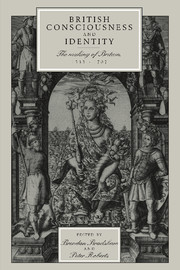Book contents
- Frontmatter
- Contents
- Notes on the contributors
- Preface
- Introduction
- 1 Tudor Wales, national identity and the British inheritance
- 2 The English Reformation and identity formation in Ireland and Wales
- 3 Faith, culture and sovereignty: Irish nationality and its development, 1558–1625
- 4 From English to British literature: John Lyly's Euphues and Edmund Spenser's The Faerie Queen
- 5 The British problem in three tracts on Ireland by Spenser, Bacon and Milton
- 6 James Ussher and the creation of an Irish protestant identity
- 7 Seventeenth-century Wales: definition and identity
- 8 Scottish identity in the seventeenth century
- 9 The Gaidhealtachd and the emergence of the Scottish Highlands
- 10 ‘No remedy more proper’: Anglo-Irish unionism before 1707
- 11 Protestantism, constitutionalism and British identity under the later Stuarts
- Index
4 - From English to British literature: John Lyly's Euphues and Edmund Spenser's The Faerie Queen
Published online by Cambridge University Press: 15 March 2010
- Frontmatter
- Contents
- Notes on the contributors
- Preface
- Introduction
- 1 Tudor Wales, national identity and the British inheritance
- 2 The English Reformation and identity formation in Ireland and Wales
- 3 Faith, culture and sovereignty: Irish nationality and its development, 1558–1625
- 4 From English to British literature: John Lyly's Euphues and Edmund Spenser's The Faerie Queen
- 5 The British problem in three tracts on Ireland by Spenser, Bacon and Milton
- 6 James Ussher and the creation of an Irish protestant identity
- 7 Seventeenth-century Wales: definition and identity
- 8 Scottish identity in the seventeenth century
- 9 The Gaidhealtachd and the emergence of the Scottish Highlands
- 10 ‘No remedy more proper’: Anglo-Irish unionism before 1707
- 11 Protestantism, constitutionalism and British identity under the later Stuarts
- Index
Summary
In sixteenth-century England writers of literature were frequently unsure exactly how to employ the flexible national category at their disposal. Often authors found themselves caught between two related but opposed desires. On the one hand, they sought to elevate the status of English literature so that it could rival the achievements of the classical world and those European nations which had imitated that heritage rather more successfully – Italy, France and, less often, Spain. On the other hand, they used ‘literature’ as either an adjunct or supplement to political representation, arguing the need for a critical public sphere where national problems could be debated. The consequence was that a celebratory nationalism was pitted against a specifically critical nationalism. In trying to perform the impossible balancing act this involved, authors often solved the problem by imagining two or more different – often overlapping – communities representing the nation at specific points within their narratives, collections of lyrics, dramas, etc. Even to writers immediately concerned with the need to bring the category of the nation into sharp focus, it remained a shadowy, barely visible wraith, all too often realised in the gaps, fissures and contradictions which constitute the margins of the texts.
The most frequently cited literary case of this problem of overlapping, conflicting and indeterminate national boundaries is the outburst by the Irish Captain Macmorris, serving in Henry V's army in France in Shakespeare's play of that name. In the scene before the battle of Harfleur, the four representatives of the British nations, Macmorris, Jamy, Llewellyn and Gower are left alone on stage, awaiting the start of battle.
- Type
- Chapter
- Information
- British Consciousness and IdentityThe Making of Britain, 1533–1707, pp. 140 - 158Publisher: Cambridge University PressPrint publication year: 1998



